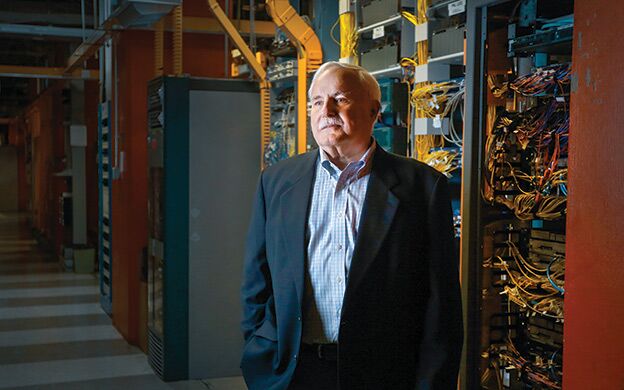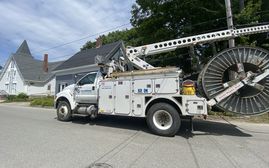Processing Your Payment
Please do not leave this page until complete. This can take a few moments.
FairPoint eyes telecom deregulation as a path to move forward
 Photo / Tim Greenway
Mike Reed, FairPoint Communications' Maine state president, says he's hopeful a legislative proposal will move the state further down the path of fully deregulating the state's telecommunications industry and allowing competition to govern the state's Provider of Last Resort requirements.
Photo / Tim Greenway
Mike Reed, FairPoint Communications' Maine state president, says he's hopeful a legislative proposal will move the state further down the path of fully deregulating the state's telecommunications industry and allowing competition to govern the state's Provider of Last Resort requirements.
An agreement reached by Maine's Public Advocate Office and FairPoint Communications LLC sets the stage for a legislative remedy addressing an unresolved issue stemming from the Maine Legislature's partial deregulation of the telecommunications industry that began in 2011.
“I really believe the agreement's language will help everyone move forward,” says Mike Reed, a 40-year veteran of the telecommunications industry who has been FairPoint's Maine state president since 2010. “It's a good start. We've been spinning our wheels up to this point. We've been trying to get this done since 2011.”
Public Advocate Tim Schneider, whose office represents the interests of all Maine utility consumers in proceedings before the Public Utilities Commission, characterizes the agreement “as better than the status quo.”
“It effectively trades deregulation of phone service in 25 communities where we feel there are alternatives [to FairPoint's Provider of Last Resort service, or POLR] for more rigorous quality-of-service standards,” Schneider says. The draft legislation based on the agreement reached with FairPoint, he adds, “is tailored to specifically protect” the state's overall goal of making sure that safe, reliable telephone service is universally available to residents living in remote rural communities.
In effect, if the agreement eventually becomes law, Maine will join at least 17 other states that have either totally eliminated all POLR obligations, or only impose them when competition is lacking for basic voice service. In Reed's view, the state's telecommunication policy needs to catch up with market realities and move in a direction that encourages greater investment in broadband phone services by FairPoint and other landline providers.
At issue is FairPoint's contention that an unresolved legacy of Maine's 2012 deregulation legislation — the POLR requirement that's still regulated by the Maine Public Utilities Commission — is an unnecessary burden that also should be deregulated. FairPoint contends Maine's POLR requirement unfairly singles it out, along with other incumbent local exchange carriers (ILECs), by imposing service quality standards that aren't imposed on competing cellular and Voice Over Internet Protocol (VoIP) services that command an ever-larger share of Maine's voice service market.
But, unlike the smaller ILECs that receive approximately $8 million in annual subsidies from the Maine Universal Service Fund to cover the higher costs of providing basic telephone service in rural areas with a customer base too small to fully cover those costs, FairPoint hasn't been allowed to tap that fund to cover its POLR costs. The reasoning has been that as the largest landline telephone provider in the state, FairPoint's urban customers in densely populated areas would help subsidize the cost of providing telephone service to its more rural customers.
FairPoint has failed in various efforts over the past four years to address ongoing POLR concerns that include not being allowed to receive a subsidy from the Maine Universal Service Fund, which is replenished by monthly surcharge fees levied by phone, wireless and cable companies on their voice telephone customers. In 2014 the company tried unsuccessfully to get the PUC to grant a request for a $67 million Maine Universal Service Fund subsidy to cover its POLR losses.
A bill submitted last year in the first session of the 127th Legislature that was designed to tackle a number of POLR-related questions eventually was carried over to the current session. The directive lawmakers gave to FairPoint and opposing stakeholders, which included the public advocate: Work out your differences and come up with mutually agreeable language for the final bill.
Reed says the agreement reflects a consensus that emerged from six stakeholder meetings held since last fall. “During those six meetings we had good healthy debate,” he says, noting that in the end it boiled down to the company and the public advocate finding a common ground they both could live with. “This gives both FairPoint and the state a path forward,” he says, in balancing the state's POLR goals with 21st century telecommunication industry realities.
Hurdles still remain
Gaining the support of Schneider's office is a significant victory for FairPoint, since the public advocate had vigorously opposed the company's more sweeping proposals embedded in LD 1302, “An Act To Increase Competition and Ensure a Robust Information and Telecommunications Market,” the bill carried over from last year's session of the 127th Legislature.
But it's by no means the final hurdle.
The next step is to work out the language of a new bill reflecting the stakeholders' consensus. LD 1302 was pulled off the table during a Feb. 24 work session of the Joint Standing Committee on Energy, Utilities and Technology. In its place, language from the stakeholders' agreement will be incorporated into what had been a placeholder bill, LD 466, having the same title. The goal is to bring the new bill to a vote by the full Legislature before its statutory adjournment on April 20.
“We're going to sweep all the stakeholder concerns into one bill,” says state Rep. Larry C. Dunphy, sponsor of LD 466 and a member of the Energy, Utilities and Technology committee. “I'm not sure we'll end up with a bill that addresses all of the concerns. It is an incredibly complex issue. There is some common agreement, but there are some difficult differences that remain.”
The draft compromise that Schneider sent by email to Mainebiz includes these provisions:
- No obligation for the existing POLR provider to provide that service in 25 communities: Portland, Lewiston, Bangor, South Portland, Auburn, Biddeford, Sanford, Brunswick, Scarborough, Saco, Augusta, Westbrook, Windham, Gorham, Waterville, Kennebunk, Standish, Kittery, Brewer, Cape Elizabeth, Old Orchard Beach, Yarmouth, Bath, Freeport, Belfast.
- Beginning Jan. 1, 2018, an incumbent POLR provider may petition to the Public Utilities Commission to be relieved of its obligation in one or more municipalities. The PUC “shall grant such request” if there's: 1. At least one wireline provider offering service to at least 95% of the municipality's households; 2. At least one mobile telecommunications provider serving at least 97% of the municipality's households.
- POLR providers not receiving Maine Universal Service Funding must report service quality metrics for “network trouble” and “missed appointments.”
- Failure to meet specified minimum service requirements will trigger PUC review and possibly lead to being directed to take steps to improve service.
- The PUC will report back to the Legislature by Jan. 15, 2018, on the impact eliminating POLR services might have had on the 25 deregulated communities.
“It's not a 'done deal' in any way,” Schneider says, declining to predict whether the compromise will pass muster with lawmakers and be enacted into law.
Rethinking the rules
For Reed, the deregulation of Maine's telecommunications industry launched by the 125th Legislature in 2011 has been all-too-similar to a 1993 movie starring Bill Murray. “It's 'Groundhog Day,'” he quips, but in his case the time loop involves the unresolved POLR question.
“I said, 'OK, as a state we shouldn't forget them,'” Reed says, agreeing with the lawmakers' intent in 2011 and 2012 that Mainers living in remote areas should have reliable basic level telephone service at a reasonable cost.
But the funding mechanism that was designed to help POLR providers recover the higher costs of serving remote customers, the Maine Universal Service Fund, ended up being limited to small rural telephone companies. FairPoint has never received money from the fund because it was viewed as having a large enough customer base to cover any losses incurred in high-cost low-return service areas (rural Maine) with profits earned in low-cost high-return areas (i.e. urban centers).
Reed says that from FairPoint's perspective that regulatory policy downplays the reality that it faces fierce competition for those urban landline customers, many of whom have opted to cut their landline cord and go solely with wireless cellphone service. Net result: FairPoint continued to be regulated as the largest POLR provider, with no compensation from the Maine Universal Service Fund, at the same time unregulated wireless and VoIP providers were eroding its landline phone customer base.
“Regulation is a substitution for the lack of competition,” he says. “This agreement moves toward matching the state's regulations with the more than ample competition [in telecommunications] that exists today.”
In a Nov. 13, 2015 blog post on the Federal Communications Commission's website, Commissioner Michael O'Rielly gives credence to Reed's concerns. Citing a 2014 FCC report tracking consumer trends in the voice market between December 2010 and December 2013, O'Rielly notes the number of landline voice customers declined by 10% each year, while VoIP customers grew by 15% and mobile customers at 3% compound annual growth rates for the same period.
“Over 45% of American homes have cut the cord and no longer have a landline telephone at home,” he writes. “Additionally, more than one-half of all adults aged 18-44 and of children under 18 were living in wireless-only households.”
O'Rielly concludes: “Given these technological and marketplace changes, it is time to rethink rules that single out one class of voice providers for more burdensome regulations simply because they account for a larger share of a shrinking slice of the overall voice pie. That's like regulating typewriters in the modern age of computer keyboard, tablets and smartphones.”
Reed acknowledges the agreement reached with Public Advocate Timothy Schneider falls short of complete deregulation of Maine's POLR services, and ignores entirely the company's arguments that it should be allowed to tap Maine's Universal Service Fund to cover the higher costs of providing POLR service in areas where there are limited options for affordable, reliable telephone service from other providers.
What the agreement does accomplish, he says, is the removal of FairPoint's POLR requirement in 25 largely urban communities where there is robust competition already. If that small step proves FairPoint's arguments in favor of total deregulation, he says it should pave the way for lawmakers to eventually complete the job begun with the 125th Legislature five years ago.
“This gives us the ability to move the ball forward,” he says.
Read more
OTT Communications brings 10GB broadband service to eastern and northern Maine
Regulators investigate FairPoint’s 2015 quality performance
Service changes to FairPoint landlines raising concerns
FairPoint strikers win victory in Maine's business court
$750K in fed funds bolster Sanford broadband access
High usage leads to FairPoint’s ‘cost recovery’ fee













Comments